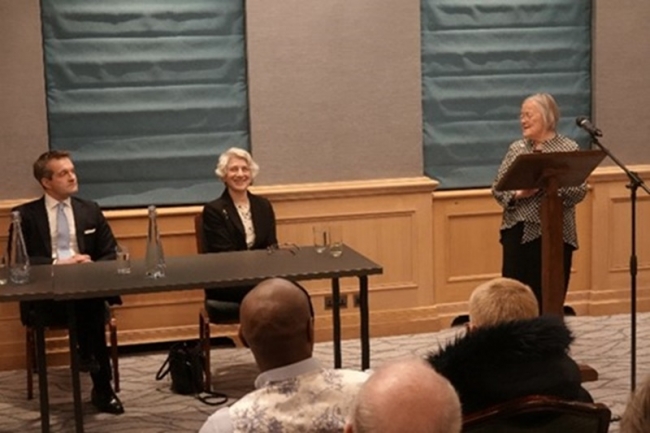Address
PO Box 4352Edlesborough
Dunstable
Beds
LU6 9EF
Telephone Number
07507 237218Email Address
secretary@bacfi.org//Past Events 2023
[2024] [2023] [2022] [2021] [2020] [2019] [2018] [2017] [2016]
[2015] [2014] [2013] [2012] [2011] [2010] [2009] [2008]
2023 Denning Lecture
BACFI AGM (22 November)
Student Evening (3 October)
BACFI AI (25 September)
Employed Bar Garden Party (13 June)
Sustainable Practices (31 May)
BACFI Wine Tasting (20 April)
Well Being at the Bar (12 April)
2023 Denning Lecture
7th December 2023
The 2023 Denning Lecture by The Right Hon Lady Rose of Colmworth DBE: “On the Job? The Law on Status in a Gig Economy”
BACFI’s members and guests were privileged to have Supreme Court Justice and BACFI Vice-President, The Right Hon Lady Rose of Colmworth DBE, PC present the 2023 Denning Lecture. It was entirely fitting that Lady Rose was introduced by former Supreme Court Justice and BACFI President, Baroness Hale of Richmond DBE, PC, FBA. We are extremely grateful to both for generously giving-up their time and for their continued and much valued support of BACFI.
 |
Lady Rose provided an insightful and relevant examination of the status of workers in the modern economy. I confess to having assumed that the phrase “Gig Economy” somehow owed its origins to the word “gigabyte”. The concept itself refers to a free market system in which organisations hire independent workers for short-term commitments, often within the IT and digital spheres. However, the etymology of "Gig Economy" does not concern gigabytes at all, but is believed to derive from one-off performances by musicians.
The Gig Economy now accounts for a significant proportion of workers in England and Wales, ranging from the more familiar Uber drivers and Deliveroo drivers through to web developers, translators and even (as highlighted by Lady Rose) promoters of werewolf fiction! In recent times, employment law has distinguished between three categories of persons: ‘employees’, ‘self-employed’ and an intermediate category, namely ‘workers’. Differing Statutory rights and protections attach to each category.
Lady Rose described the importance of the seminal 2021 Supreme Court decision in Uber BV and Others v Aslam and Others [2021] UKSC 5, which recognised that employment rights asserted by claimants are statutory and not contractual. Accordingly, the primary task of the courts and tribunals is not to interpret parties’ contracts, but to construe the relevant statutory provisions and determine whether individual claimants fall within their ambit. This, in turn, requires decision-makers to look beyond the labels applied by parties’ agreements to the substance of how relationships operate in practice and, in particular, the key indicia of control.
The irony, of course, is that the relevant Statutes were drafted largely before concepts of “Deliveroo’s” and “ride-hailing” came into existence. Lady Rose also identified another important aspect of the law of employment status, namely that no ‘one size fits all’ and different considerations apply to determining employment status in different contexts. Accordingly, there are marked differences in the law of employment status in the contexts of vicarious liability, trade unions and tax. Each category has been developed for different reasons and seeking to introduce consistency would risk undermining the public policy objectives that underpin them.
What has changed in recent times is the social and technological context within which questions of construction and interpretation have to be answered and the pace at which change itself is taking place. The law surrounding employment status has moved on considerably from the concept of ‘master and servant’ that was still dominant in Lord Denning’s time. There is no doubting the commitment of the Parliamentarians and judges that the law should continue to keep pace with technological innovation. Quite what Lord Denning would have made of today’s Gig Economy, we could previously only hazard a guess, but we can now rely upon AI to let us know!
 |
 Photo credit Daniel Parkinson |
Archive list of 2022 events
Archive list of 2021 events
Archive list of 2020 events
Archive list of 2019 events
Archive list of 2018 events
Archive list of 2017 events
Archive list of 2016 events
Archive list of 2015 events
Archive list of 2014 events
Archive list of 2013 events
Archive list of 2012 events
Archive list of 2011 events
Archive list of 2010 events
Archive list of 2009 events
Archive list of 2008 events
Archive list of 2007 events

